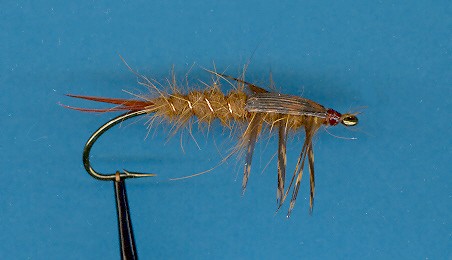On The Fly
"Fly tying is a school from which we never graduate"
 TYING NEWS
TYING NEWS
The annual NW Fly Tying Expo was held March 20th in
Eugene. Thirteen RFF members - a record number - demonstrated their skills
at this successful event. They were chosen along with 150tiers, the best of
the northwest and beybnd. The Southern Oregon group dominated the weekend
guest list at the Downtown Motel. There was so much bull flowing we all
should have worn waders in the parking lot. We all came away with something
new: new materials, new patterns and techniques, and new friends.
Southern Oregon Fly Tiers (SOFT) held their March
meeting, March 24th, along with the final classes for beginner and
intermediate fly tiers. Johnny Hale and I are glad to report that all
students passed the course and are ready to move up to the next level. SOFT
continues to grow and we invite all tiers of all skill levels to join us on
every 4th Wednesday of the month for an enjoyable evening of exchange,
flies, lies, and a lot of knowledge.
 PATTERN OF THE MONTH -Hare's-Ear Stonefly Nymph
PATTERN OF THE MONTH -Hare's-Ear Stonefly Nymph
Hook: Tiemco 200R, sizes 4, 6 and 8.
Weight: Lead wraps under thorax.
Tail: Split brown-dyed goose biots.
Body: Dark hare's-ear dubbing, tapered.
Shellback: Brown wild-turkey tail.
Rib: Copper wire.
Thorax: Dark hare's-ear dubbing.
Legs: Drawn legs of brown Hungarian partridge flank feather.
Wingcase: Brown wild-turkey tail.
Last month's column featured the Hare's Ear Soft Hackle. This month's pattern is yet another variation of my favorite nymph, the Hare's Ear, tied as a stonefly. Simply substitute brown-dyed goose biots for the standard tail, dub a little heavier tapered abdomen,add a brown turkey shellback,a copper wire rib, hare's ear thorax,drawn partridge legs, and a turkey wingcase. Like other Hare's Ear variations, the effectiveness of this fly may have something to do with the dubbing material itself. Good Hare's Ear is blended from the darker hair on a European hare's mask with the guard hairs mixed in. There are several natural shades and textures representing exactly the coloration a nymph, afraid of being eaten by a trout, would want to look like.
TYING TIPS - Two More Variations
1) You can tie a Golden Stone version of this month's fly by simply
changing the color of the tail biots and the color of the body dubbing to a
golden yellow. Be sure to weight your stonefly nymphs under the thorax area.
2) Try a Hare's Ear Damsel for lakes, tied on a size 10, 12, or 14 hook.
Use dark bead-chain eyes for shallow water or small dumbbell eyes for
deeper water. It's tied with a brown partridge tail, thin hare's ear
abdomen with a fine copper wire rib, hare's ear thorax with drawn partridge
legs, a brown turkey wingcase, a pair of eyeballs with dubbing wrapped
figure eight through them. This fly is not only a good damsel fly nymph but
also a great still water search pattern.
Tie One On,
Dan Kellogg (you can contact me at FLYGUY@EZNORTHWEST.COM)